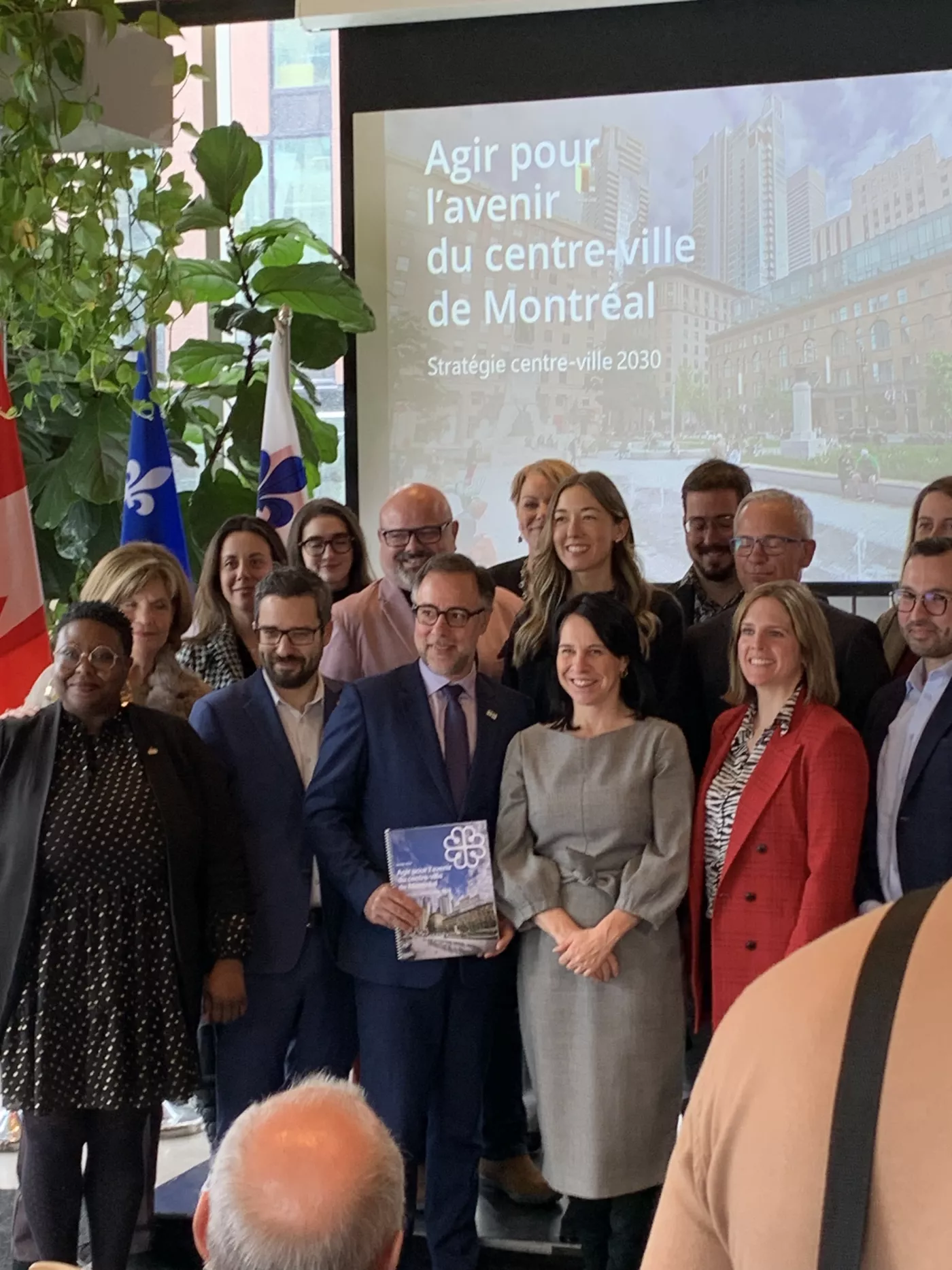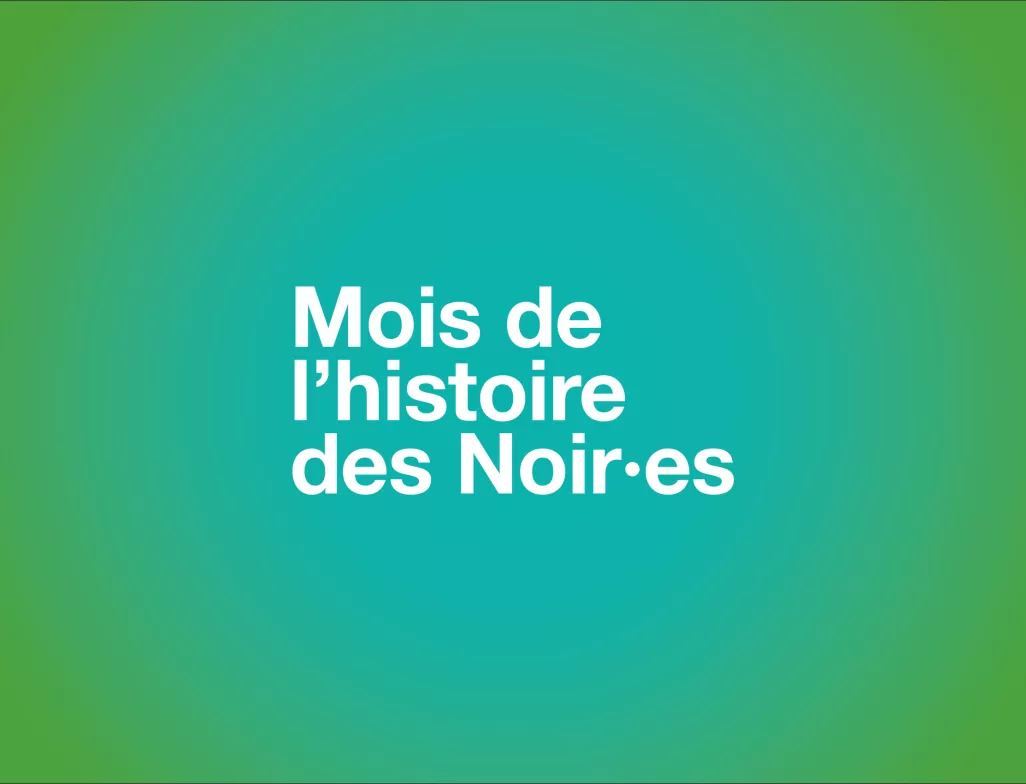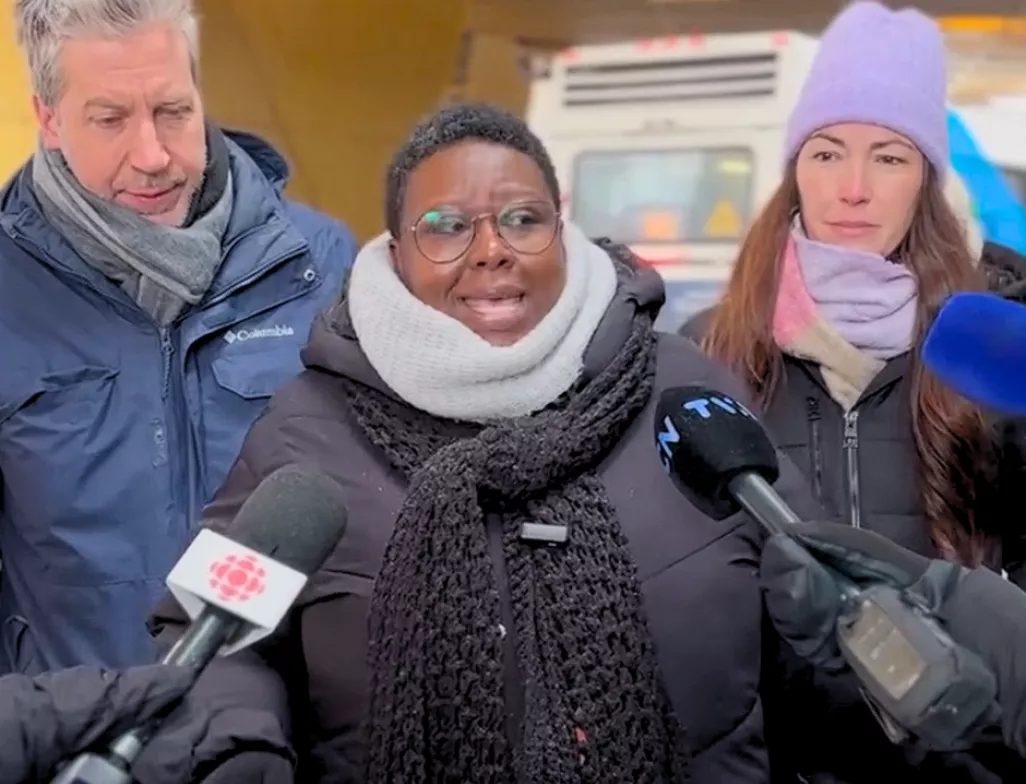To strengthen the resilience of Quebec's economic and cultural heartland, the Ville de Montréal unveils Agir pour l'avenir du centre-ville de la métropole, a concerted strategy to pursue efforts towards a sustainable revival of its downtown core, through to 2030. This work is the fruit of a long-term process, carried out with the downtown ecosystem, and aims to perpetuate the collaboration of all parties around a common vision targeting concrete actions to find solutions to current and future challenges.
The Ville de Montréal's vision for the future of downtown is based on nine initiatives, divided into three main priorities: strengthening the identity of neighborhoods, creating new living environments and improving mobility and cleanliness, and creating green routes. These initiatives, which will be carried out in conjunction with the various players involved in transforming the downtown area, are designed to energize all the neighborhoods that make it up, and encourage its continued development.
In all, the City of Montreal will invest more than a billion dollars in its downtown area over the next ten years. The new Downtown Strategy Montréal 2030 puts forward the following priorities:
Enhancing neighborhood identity
1- Reinforce the personality of neighbourhoods with distinctive new street furniture, heritage features and public art circuits;
2- Celebrate the northern character of downtown by creating a unique winter experience with interactive and immersive itineraries in the heart of the metropolis, in collaboration with partners such as Tourisme Montréal and local artisans;
3- Designate the Quartier latin as a "quartier de la francophonie", create a 24-hour sector and carry out major development projects within the city's assets, notably at Îlot Voyageur and Parc Émilie-Gamelin.
Creating vibrant, mixed-use neighborhoods
1- Create two new residential neighborhoods in the Faubourgs and Bridge-Bonaventure sectors, with the potential to create over 15,000 housing units;
2- Consolidate downtown's position in the technology, healthcare and cultural and creative industries sectors;
3- Prioritize investments in existing buildings to reverse rising vacancy rates, notably at the former Royal Victoria Hospital and the Îlot Voyageur.
Improve mobility, cleanliness and create green routes
1- Accelerate development of phase 3 of the Quartier international;
2-Create better links between neighborhoods and establish a pedestrian-priority zone in Old Montreal;
3- Improve the cleanliness of public spaces, building maintenance and barrier management.
Implementation of the vision for the future of downtown will unfold over the next six years, and will be the subject of a series of public announcements as projects are developed. Starting in 2024, the city will forge the necessary links with the downtown ecosystem for externally-driven projects, and set up a governance structure made up of key partners to ensure project completion.
This long-term strategy complements the many strategies already underway to address the crisis of vulnerability and the ecological transition, such as the Village Collective Strategy, the Chinatown Action Plan and many other initiatives carried out in collaboration with community partners and various levels of government. To view the Strategy, click here, and to download photos and maps, click here.
To view the video, click here.
Quotes
"Downtown is the economic and cultural heart of Quebec. Although it's doing quite well, certain challenges have become more pronounced in recent years, as we've seen in other downtowns around the world, in terms of occupying office tower space, commercial vitality, social issues and mobility. Our challenge is therefore a major one: to rethink the long-term development of the downtown area and implement structuring initiatives to strengthen its attractiveness and resilience. This strategy proposes concrete initiatives to achieve this. It is based on a renewed and strengthened experience in every season, to propel downtown's appeal and influence - socially, economically and culturally - on a local, national and international scale," declared Montréal Mayor Valérie Plante.
"More than 200 socio-economic players were met to explore possible long-term solutions. The strategy that will be deployed over the next seven years, with the collaboration of all our partners, will make the heart of Montreal a more beautiful, greener, safer and cleaner place. These initiatives are in addition to the numerous initiatives undertaken by our downtown partners and the various measures we are already putting in place to improve social cohabitation, mobility and the feeling of safety downtown. I am convinced that they will enable us to ensure that downtown Montreal will continue to fully assume its role as the economic engine and cultural heart of Quebec for decades to come," stated Luc Rabouin, President of the Executive Committee and responsible for economic and commercial development, knowledge, innovation and design.
"I would like to congratulate the Ville de Montréal on its leadership in the long-term development of the downtown area, a crucial initiative for our metropolis. Enhancing neighborhood identity, creating vibrant new spaces and improving mobility and cleanliness are key actions, not only for residents, but also for our city's tourist appeal. The designation of the Latin Quarter as a "Quartier de la francophonie" adds a unique dimension to our tourism offering. Together, these initiatives undeniably contribute to shaping a dynamic, forward-looking downtown, reinforcing Montreal's appeal as a leading tourist destination," added Yves Lalumière, President and CEO of Tourisme Montréal.
"Global economic growth is slowing down, and metropolises are increasingly competing to attract the best investment and talent. This context compels us to redouble our efforts to ensure that Quebec's economic engine performs well on the international stage. By capitalizing on our most strategic assets, such as an innovative economy and a pool of qualified talent, Montréal can remain a destination of choice for workers, companies and international organizations from around the globe," says Stéphane Paquet, President and CEO, Montréal International.
"The vitality of our downtown is based, among other things, on its identity, its mix and mobility. It is therefore essential to continue investing to strengthen these strategic assets that make our downtown one of the most vibrant on the continent," said Glenn Castanheira, General Manager of Montréal centre-ville.
"We congratulate the City of Montreal on adopting a long-term strategy. It reflects many of the initiatives undertaken by the Quartier des spectacles Partnership, as well as the achievements of recent years in working with the economic, business and cultural communities to stimulate the vitality of the downtown area. Now that the Quartier des spectacles has turned 20, we are pleased to see that its development remains a priority for the City of Montreal, which has included in this strategy projects to revitalize the eastern pole of our territory, the Quartier latin, improve quality of life, affirm the northern character of the city's downtown core and optimize the hosting of festivals. Finally, together with all the players in the Quartier and its ecosystem, we are delighted to play a full part in implementing this strategy, and to continue raising the profile of the downtown area," says Monique Simard, Chair of the Board of Directors of the Quartier des spectacles Partnership.



